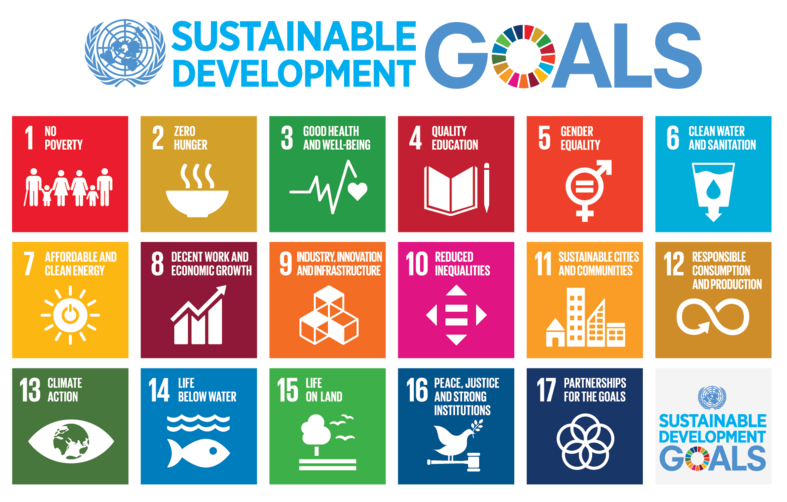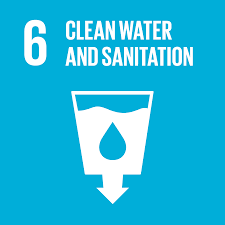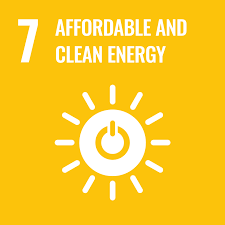What are the Sustainable Development Goals (SDGs)?
The Sustainable Development Goals are a collection of 17 goals meant to act as a “blueprint to achieve a better and more sustainable future for all”. The goals were set by the United Nations in 2015 to act as a universal call to action to end poverty, protect the planet, and ensure that all people enjoy peace and prosperity by 2030.
 Why Align Business Goals to the SDGs
Why Align Business Goals to the SDGs
The SDGs act as guidelines for businesses to assess and manage social, economic and environmental risk, while also improving their image, reputation, and strategic position in today’s world markets. The SDGs can also be a tool for businesses to use to communicate performance, engage with various stakeholders, and set targets and actions.
An important part of aligning with the SDGs is the collaborative aspect, and helping to solve the world’s most challenging tasks in sustainability. This opens opportunities of fostering and sharing knowledge with other businesses and groups working towards similar SDGs, and forming new partnerships from this. According to the World Bank, small and medium enterprises (SMEs) represent about half of the developing world’s workforce, and therefore SMEs will have a huge impact on the SDGs. The goals will not be realized without the participation of businesses.
Green Economy London’s Alignment with the SDGs
The United Nations Sustainable Development Goals include many focused on restoring our natural environment and building more sustainable cities. This aligns well with the four target areas that Green Economy London supports businesses with, which include reducing waste, water, and emissions, as well as becoming environmental stewards. We have identified the six UN SDGs that most closely align with our work below to help members understand which SDG’s they are having an impact on when they participate in our program.
 Members setting and working towards water reduction targets are aligning with this SDG because reducing water is a key factor in preserving clean water sources for future generations. Clean water is a necessity for life, and by implementing a water conservation culture into your workplace, it educates people on how to be more sustainable in their everyday lives. Reducing water use also decreases the pollution and energy involved in the pumping and sanitization process, which relates to many of the other SDGs.
Members setting and working towards water reduction targets are aligning with this SDG because reducing water is a key factor in preserving clean water sources for future generations. Clean water is a necessity for life, and by implementing a water conservation culture into your workplace, it educates people on how to be more sustainable in their everyday lives. Reducing water use also decreases the pollution and energy involved in the pumping and sanitization process, which relates to many of the other SDGs.

Switching to renewable energy in order to reduce GHG emissions is a solution many businesses are looking to in order to reduce operating costs and reduce carbon output. Setting a GHG emissions reduction target, creating an action plan, implementing projects to reduce energy usage and switching to renewable energy will align your business with this goal.
![]() All target areas, waste, GHG emissions, water, and environmental stewardship play an important role making a city more sustainable. Setting targets in any of these areas will help align your business with goal number 11. This goal is interconnected with many of the other 5 goals listed here.
All target areas, waste, GHG emissions, water, and environmental stewardship play an important role making a city more sustainable. Setting targets in any of these areas will help align your business with goal number 11. This goal is interconnected with many of the other 5 goals listed here.

Tracking waste, diverting waste from the landfill and setting a reduction target encourages businesses to be accountable for their waste footprint. It encourages sourcing different materials/products that have a continued lifespan after intended use. Implementing recycling and organic streams into business operations also reduces the GHG emissions from waste that would have previously been sent to landfill. Many environmental stewardship projects also fall under this goal, an example being supply chain management一Ex. Going through your company’s supply chain thoroughly, and looking for opportunities to reduce waste in areas where certain supplies come in packaging that cannot be recycled and look for alternatives.

Like goal 11, this goal is embedded throughout Green Economy London’s program. All four target areas are related to climate action in some way. GHG emissions reductions being the obvious action, but also by reducing waste, water usage, becoming an environmental steward all help create a more resilient community to climate change and help reduce emissions.
 This goal primarily relates to our environmental stewardship framework. Participating in this target area by completing projects that protect the natural environment, improve pollinator and native species populations, improve biodiversity, and reduce storm water runoff and associated pollution all are aligned to goal number 15.
This goal primarily relates to our environmental stewardship framework. Participating in this target area by completing projects that protect the natural environment, improve pollinator and native species populations, improve biodiversity, and reduce storm water runoff and associated pollution all are aligned to goal number 15.
How to Align your Business with the SDGs
 Step 1 – Understand the SDGs and what you already do that helps achieve the various SDGs. Determine what you currently measure and value in your existing business operations (ex. Gender equity? Biodiversity? Clean water?).
Step 1 – Understand the SDGs and what you already do that helps achieve the various SDGs. Determine what you currently measure and value in your existing business operations (ex. Gender equity? Biodiversity? Clean water?).
Assess the impact of your company against the seventeen SDGs, and identify related risks and opportunities across your entire value chain. Here is a helpful tool called the SDG Compass that can help you map out the SDGs and your business goals.
Step 2 – Set goals. Identify which SDGs your business is interested in and how you can support through your work. Link relevant targets to your existing business activities. It is important to link the identified SDGs to actual business targets and KPIs, in order to monitor and communicate progress. A great example of linking existing business targets with SDGs is how Schneider Electric aligned with all 17 goals through evaluating their internal business goals. They used 5 existing target areas within their company: Core Business, Climate, Circular Economy, Ethics, Health & Equity, and Development in order to prioritize and align SDGs within these 5 internal targets.
Step 3 – Integrate the goals into your business. Communicating this throughout your company, in order to integrate the targets into existing strategy, thus taking into account procedures, business models, and supply chain changes.
Step 4 – Communicate externally. Communicate your commitments to the SDGs in communication materials, website, annual reports, etc. This helps ensure transparency and accessibility of performance to various internal and external stakeholders. There are many useful tools emerging to help companies better understand how they can contribute to the SDGs from a holistic approach (see tools below).
Existing Tools to Assist Your Business in Aligning with the SDGs
SDG Compass – Business Tools – This inventory maps existing business tools against the Sustainable Development Goals (SDGs). It allows you to explore commonly used business tools that may be useful when assessing your organization’s impact on the SDGs. Later additional types of tools will also be added.
SDG Industry Matrix – The SDG Industry Matrix aims to inspire and inform greater private sector action to drive inclusive, sustainable prosperity. Through the lens of “shared value” the private sector can identify opportunity in addressing social and environmental challenges.
Business for 2030 – This site showcases business’ past and continuing contributions to sustainable development through the prism of the SDGs with the goal of stimulating a more productive partnership between the public and private sectors at the UN and at national levels and to demonstrate the need for a proportionate role for business in the negotiations, implementation and follow-up mechanisms of the 2030 Development Agenda at both the UN and at national levels.
Business Charter for SDGs – The Business Charter for Sustainable Development has been specifically designed to help companies contribute to the SDG implementation. Sustainable economic growth provides the foundation and resources for societies to develop and prosper, and for people to meet their needs and pursue their aspirations. It helps enable economic empowerment and poverty eradication, advance environmental stewardship; and contribute to dealing with the trans-boundary global challenges highlighted by the UN Sustainable Development Goals.